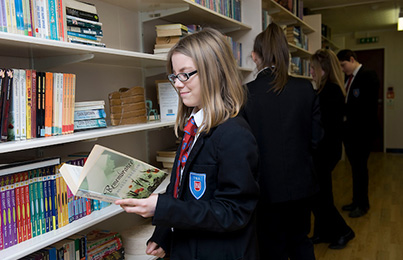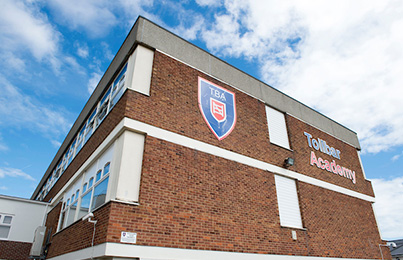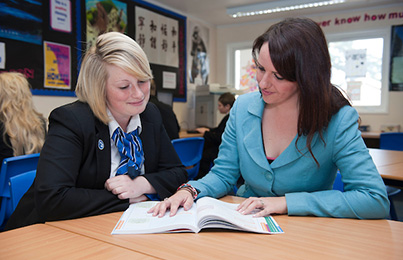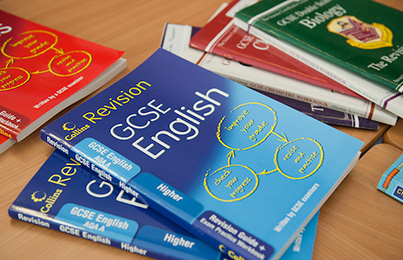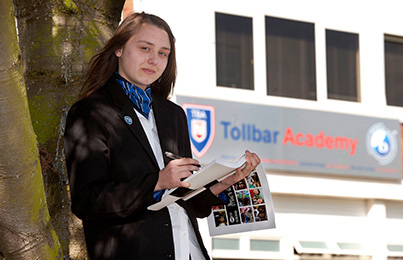English
Curriculum Intent, Implementation & Impact
- English
- Ethos & Values
- Knowledge & Skills
- Resources & Facilities
- Courses & Qualifications
- Learning Outside The Classroom
- Where Does This Take Me In The Future?
English
"Language is words. It's bridges, so that you can get safely from one place to another. And the more bridges you know about, the more places you can see!"
'Roots' - Arnold Wesker
Studying English Language and English Literature at Waltham Toll Bar Academy encourages students to develop the skills, knowledge and communication abilities necessary to succeed in the modern world. An encouraging and supportive learning environment ensures our students achieve their full potential in the study of these vital and exciting subjects.
Please explore these pages to find out more about what we offer.
Ethos & Values
Our aims are:
- To enhance children's quality of learning through the effective delivery of the English curriculum, in a way which is lively and thought-provoking, enabling students to develop their own opinions positively.
- To make English enjoyable as a subject through resources and specialist teaching expertise. Students are encouraged to maximize their full potential in the three areas of language development: reading, writing, and speaking and listening.
- To ensure that learners build confidence, feel valued, motivated and informed about their own progress and are proactively involved in reviewing and evaluating their individual achievements.
- To have consistently high expectations and match these with high quality resources and learning strategies.
- To provide a range of learning experiences appropriate to the age, ability and needs of the students. Students are encouraged to actively participate in class lessons, developing the ability to communicate effectively, accurately and with confidence, both orally and in writing, in a variety of styles and situations.
- To support the English Curriculum and student's progress through the development of independent learning at home.
Knowledge & Skills
- Students will improve oral, reading and writing skills, experiencing a wide range of learning styles from specialist teachers.
- Focusing on the rudiments of Speaking and Listening will enable students to become confident, articulate and coherent speakers. Students will become adept at speaking in a range of different situations and for different audiences. All students are encouraged to express personal and informed opinions through discussion, presentations, role-play and improvisation.
- Students will develop their ability to read for different purposes - for information, research, cultural study and personal enjoyment.
- Students will improve their abilities in the written mode so they are able to write for a wide variety of different audiences and contexts. The need for accuracy in spelling, punctuation, grammar and paragraphing is emphasised and the opportunity for honing these vital components is promoted throughout our comprehensive Schemes of Work.
- There is scope for students' personal growth as learners, through active participation in class lessons and homework.
Resources & Facilities
- All lessons are taught in specialist rooms, most of which are equipped with Interactive Whiteboard. Video and audio recording of students' presentations is encouraged to aid self and peer-assessment.
- Contemporary and classic literature is used to support lessons. All works are tailored to individual classes by teachers. The English Curriculum Area has access to an extensive range of literary resources across all Key Stages.
- An English Curriculum Area computer suite can be booked for lessons that require students to access the internet or produce work electronically.
- A Sixth Form Library and Study Area is available providing access to texts suitable for study at Advanced Level.
- We work closely with Learning Support and utilise the provision of the mentoring rooms where necessary and beneficial for individual students.
Courses & Qualifications
Key Stage 3
At Key Stage 3, students follow an engaging skills-based curriculum developed by our own English specialists. Schemes of Work aim to develop students' passion for reading through exposure to a wide range of different text types across the 19th, 20th and 21st Century. Development of reading, writing and speaking and listening skills is at the heart of the Key Stage 3 curriculum. All students have the opportunity to analyse poetry, prose texts and works from different cultures, and to participate in play-reading so as to enhance and develop these skills.
Year 7
Over the course of Year 7, students will read a range of exciting and challenging material as they cover different Schemes of Work. Engaging and targeted class readers are used to support character and theme analysis. Students will explore a range of genres and genre conventions, as well as developing their skills as writers through exploration of dystopian fiction. In Year 7 students will also read a range of poetry based upon the theme of people. In addition, they will have the opportunity to engage with older text types through the teaching of the 'Famous Literary Writers of the 19th Century' Scheme of Work.
Year 8
Year 8 continues to develop and support progression of new skills introduced at the start of Key Stage 3. Students will continue developing their passion and enthusiasm for literature through a variety of texts types linked to the theme of war. They will also explore works by Charles Dickens as well as continuing to appreciate contextual influences of the era. A class reader will also be chosen to challenge students and support progression of analytical skills. The 'You Have a Voice' Scheme of Work aims to encourage opinionative writing and develop students' confidence in preparation for speaking and listening activities as they progress through the Academy.
Key Stage 4
The Key Stage 4 curriculum prepares students for GCSE English Language and GCSE English Literature. The two qualifications are taught separately offering students the opportunity to engage in depth with different texts types across the 19th, 20th, and 21st Century, as well as developing their skills as speakers and writers.
GCSE English Language
AQA GCSE English Language consists of two examinations, each being 1 hour and 45 minutes. Across the two equally weighted papers, students will answer reading assessment questions on texts from different time periods, followed by one writing task on each paper. Students will also be expected to complete one speaking and listening presentation (Spoken Language Endorsement). The outcome will be reported separately on their GCSE certificates.
Students will develop in their ability to identify and comment on writers' use of linguistic and structural features, as well as be able to compare texts, commenting upon writers' different attitudes and perspectives. Written ability will be developed through practise of descriptive, narrative, persuasive and argumentative responses.
GCSE English Literature
AQA GCSE English Literature consists of two examinations: Paper 1 assesses understanding of 'Macbeth', by William Shakespeare, and the 19th Century text 'A Christmas Carol'. The first examination is 1 hour and 45 minutes long and it is worth 40% of the final grade. Paper 2 is 2 hours and 15 minutes and consists of four questions assessing responses to the modern text 'An Inspector Calls', an anthology of poetry on the theme of 'Power and Conflict', an unseen poetry response and an unseen poetry comparison response.
Students will study these prescribed texts in Year 9 and Year 10 before revising and developing their understanding of the course' requirements and expectations in Year 11. They will practise and develop their analytical skills commenting upon the effect of writers' methods. Students will also develop a greater appreciation of the texts studied through engagement with contextual factors and exploration of how contextual factors have motivated and influenced the production of each set text.
Key Stage 5
At Key Stage 5 students have the opportunity to study either A Level English Literature or A Level English Language and Literature. Both courses are assessed at the end of Year 13 through 2 examinations and submission of an independent investigation.
Learning Outside The Classroom
The English Curriculum Area offers a range of activities to enhance learning in the classroom and beyond the set programme of study.
Key Stage 3 Reading Club
Meeting at lunchtime once a week, students share their love of reading. They talk about books they enjoy and would recommend, reading extracts to each other and producing fun ways to develop their favourite texts through activities such as quizzes, creating games based on books and characters, and writing short stories.
Creative Writing Club
A club for students with an interest in creative writing. Identifying and developing creative writing skills and strategies through modelling of effective skills, students learn to choose and utilise varied techniques to become effective readers, writers, and oral communicators.
From Book To Film Club
For those that have an interest in media, From Book to Film provides students with opportunity to compare how writers and film makers present plot differently. Students are encouraged to suggest films for viewing, based upon their own independent reading. The club encourages literary discussion and exploration of narrative craft beyond students' daily English lessons.
Additional Activities
The English Curriculum welcomes touring theatre companies to enhance students' dramatic experiences and study of literature texts. We also run regular competitions that give students the chance to see their work published. Students are encouraged to appreciate the relevance of English beyond the classroom - this further enhanced through promotion of Further Education taster days and visits to The University of Lincoln.
Where Does This Take Me In The Future?
As English underpins all other subjects in the curriculum, it plays a major role in preparing students for both academia and working life.
- Provides opportunities for students who may wish to be employed in all areas of Business.
- Provides a good progression route to more advanced qualifications, particularly in the Humanities areas.
- The study of English improves students' abilities to express their ideas clearly, coherently and confidently in both speaking and writing, and to communicate effectively in all areas of adult life.




